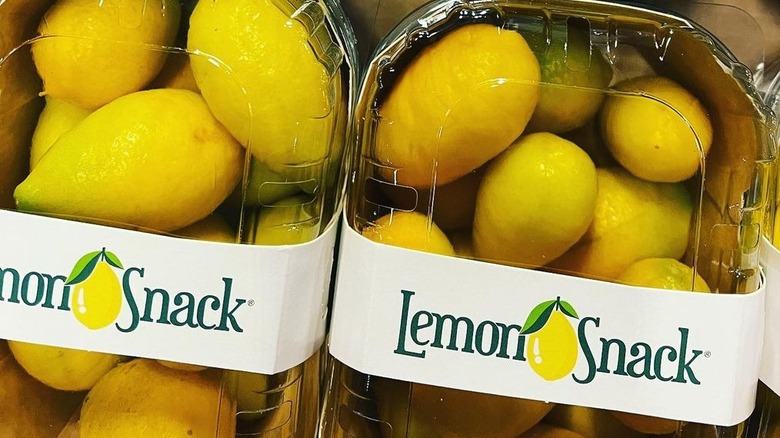The Italian Lemons You're Meant To Eat Whole
The flavor of a lemon is undeniably a favorite around the world. From lemon meringue pie to lemonade and lemon roasted chicken, there are so many zesty applications from snacks to sips, both sweet and savory.
That said, most people wouldn't ever consider consuming a lemon whole, and as such, recipes have been concocted to help repurpose what is left behind after using lemon juice. For example, making a homemade lemon-pepper seasoning that'll have you saving all your lemon peel, which answers the question, should you throw out your citrus rinds?
But if you're a lover of lemons, pucker up — the time has come for you to have a chance to enjoy a lemony fruit in all its glory, rind and all. There is a variety now being produced with the intention of being eaten in its entirety. The brand that has rolled out this head-turning little flavor bomb is from the southern Italian region of Basilicata, with the fruit grown in the Metapontino area. And while the product is called Lemon Snack, in fact, what they offer isn't a lemon at all — it's actually a limequat, which is the offspring of a lime and a kumquat. But the result is a slightly smaller lemon-presenting treat that is not only less tart, but entirely edible.
Should you eat a whole lemon?
If lemon is such a beloved flavor, why don't most people eat them the way they might an apple or even an orange? Well, lemons are super high in acid, which is not only potentially off-putting in the flavor category, but can be actually painful — particularly if you have sensitive teeth, stomach lining issues (like ulcers or gastroesophageal reflux), or are prone to heartburn.
And while the rind is perfect for rimming cocktail glasses or zesting over fresh fish, depending on the variety of lemon, it can also be too bitter or tough to be enjoyable as is. There are ways to make the skin more palate-friendly, but they typically require some kind of processing, like candying or preserving in salt, both of which tone down some of the more potent acidity and balance the bitter taste with sweetness or saltiness.
The Lemon Snack lemon, on the other hand, is purported to be low in acid (although no specifics are provided by the company), which makes it more approachable, and has a skin you can bite right into, much like a peach or a pear. The producer suggests you can also still enjoy this fruit the way you would a traditional lemon, for example in salad dressings or as a garnish, but the size and accessibility makes it ideal for — as the name suggests — snacking. And TikTokers have been doing just that, one eating it sprinkled with salt and some chilli flakes.
Can you buy Lemon Snack in the U.S.?
At the moment, you'd have to travel to Europe to get your hands on a Lemon Snack, but in the meantime you can convert your local lemons into sweet slices with sugar or honey, which may help you get some extra lemon oomph into regular rotation. At least for now it's good to know that there's a lemon out there in the world we're meant to enjoy whole.
But don't let that stop you eating regular lemons – although you may want to stop making certain mistakes with lemons like eating lemon slices from the bar or not squeezing them fully, before you tuck in to a batch. What you should know is that there's so much good that can come from enjoying them in any form. The nutritious fruit is considered an aid to preventing illnesses from anemia to cancer, and the citric acid can even help stave off kidney stones. The peels themselves also have a high concentration of nutrients, including vitamin C, calcium, and fiber, and can support everything from digestion to heart health, as well as boosting immunity and even fighting inflammation.
And when the Lemon Snack does make its way here, you may wind up digging into those rinds more often. The Lemon Snack company also claims its fruit is high in polyphenols, a type of antioxidant which, can help manage blood sugar, promote digestion and have cognitive benefits, too.


